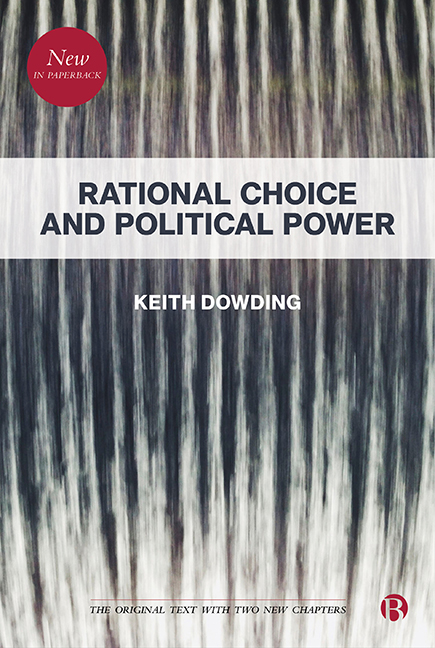9 - Some Further Thoughts on Power
Published online by Cambridge University Press: 30 April 2022
Summary
What I would do differently now
Following its publication, the reaction to Rational Choice and Political Power (hereafter RCPP) was, to put it mildly, rather slow. Jim Johnson, whom I did not know at the time (I later co-edited the Journal of Theoretical Politics with him), wrote a nice short review in Ethics, Peter Morriss a longer and more critical but respectful one in Utilitas, and there were a handful of other reviews – in Political Studies, Acta Politica and such places – but that was about it.
I realize now that I blew it with the title. Most academics who were interested in social and political power looked askance at rational choice. Meanwhile, rational choice scholars who thought about power were interested in work far more formal than that contained in the book. What I wanted to do was to bring the results of formal work to bear on the empirical analysis of power in society, whilst critiquing those who did not think we could study power empirically. By keeping it non-technical I thought I could draw the power researchers in, but my title put off most of those who might have cared. The original idea for RCPP came from my critique of Steven Lukes's three dimensions of power. I thought the collective action problem could explain everything which he thought required adding dimensions of power. However, RCPP does not simply analyse power in terms of collective action but uses, informally, a decisionand game-theoretic framework to conduct its conceptual exercise. I argue that we can measure power by agential resources, building up a picture of the power structure through resource-holding and the incentives that lead some to be privileged beyond what their simple resources seem to suggest. And if I had used the term ‘privileged’ for those who gain and ‘wretched’ or similar for those who lose, my argument there might have drawn less criticism.
Having said that, if I was rewriting the book today, I would make collective action even more central, since it can help explain elements of the power structure outside even of Lukes's general account. I also believe that game-theoretic analysis of the internal mind – how we think of our own identities – can illuminate aspects of social power that go beyond conscious interpersonal relationships.
- Type
- Chapter
- Information
- Rational Choice and Political Power , pp. 173 - 192Publisher: Bristol University PressPrint publication year: 2019

